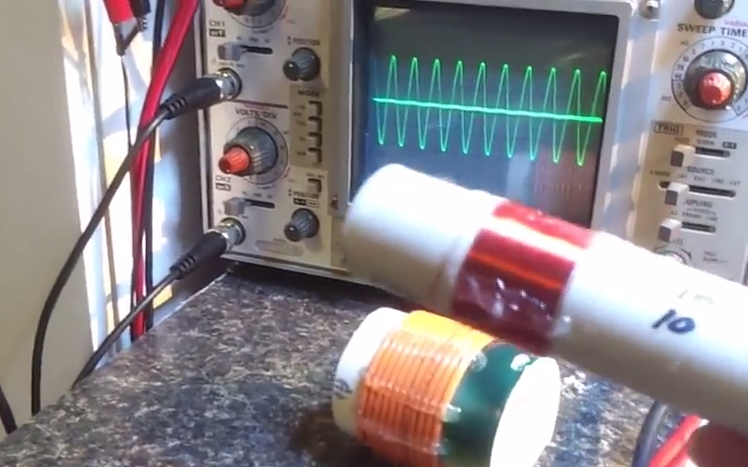[James] has a friend who teaches at the local community college. When this friend asked him to build a transformer coupling simulation, he was more than happy to oblige. Fortunately for us, he also made a video that explains what is happening while showing the output on a ‘scope.
For the simulation, [James] built primary and secondary coils using PVC pipe. The primary coil consists of 11 turns of 14AWG stranded wire with 4V running through it applied. The first secondary he demonstrates is similarly built, but has 13 turns. As you’ll see, the first coil induces ~1.5V in the second coil. [James] first couples it with the two windings going the same way, which results in the two 2Mhz waveforms being in phase with each other. When he inserts the secondary the other way, its waveform is out of phase with the primary’s.
His second secondary has the same diameter PVC core, but was wound with ~60 turns of much thinner wire—28AWG bell wire to be exact. This match-up induces 10V on the secondary coil from the 4V he put on the primary. [James]’ demonstration includes a brief Lissajous pattern near the end. If you don’t know enough about those, here’s a good demonstration of the basics coupled with an explanation of the mechanics behind them.
















Don’t know why [James] called it a simulation. Since actual magnetic coupling is occurring, it’s more aptly called a demonstration. Semantics aside, it’s a good hands-on demo. One could also try inserting ferrite or metal rods.
PVC isn’t “inductive coupling” rated. The frequency that these kind of experiments are conducted leads me to believe that someone will be incapacitated soon.
?
its a joke. people use PVC in systems with high pressure and pvc is known to protest suddenly and violently to too much pressure.
Usually when a hack goes up and some guy is using a store bought PVC tube with something high pressure on the inside and people mention that that thing could just pop and ruin his day and that PVC is not “pressure rated”.
The comment is a tongue-in-cheek claim that pvc is not rated for inductive coupling and something bad may happen because you’re using a part in a way that was not vetted by the manufacturer.
Actually, at microwave frequencies, the absorption of PVC is pretty high. Try putting a piece in your microwave oven for a short time (also add a glass of water to protect the microwave). It will be hot.
Therefore, do not use PVC tube as a radome for antenna’s.
“with 4V running through it”… Anyone else annoyed by this common misinterpretation?
It’s not a problem if the amperage across it is correct.
Yeah I went there, I said amperage.
That bothers me and certainly must confuse beginners.
That is excruciatingly bad, but not as bad as the undefined term SFW…
SFW = Safe For Work. I think it’s because the title refers to ‘coupling’ which is a euphemism for sex. This is a reassurance to the hackaday user that they will not be exposed to any pictures of yucky, yucky naughty party, at least on this site. I, for one, am reassured. Phew!
s/party/parts dammit
“yucky, yucky naughty party”??? What on earth does that mean?
Yes I looked up on Google what SFW means – and if I have to do that I am immediately at odds with the author, I think silly attempts at juvenile humour like that do little to add to the, admittedly little, credibility of the site.